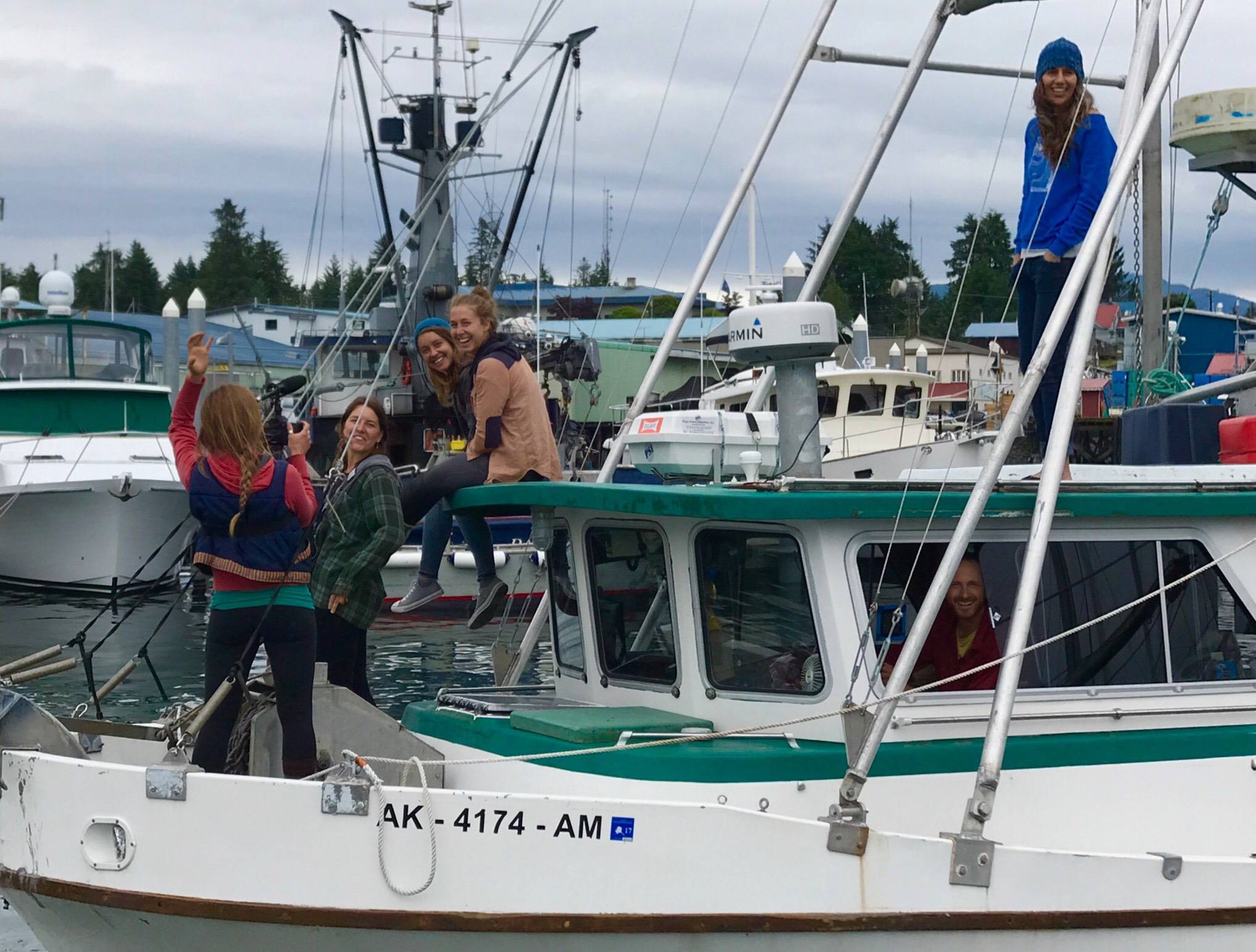One great part of this summer has been getting to meet people on their way to adventures around the state. I was lucky enough to talk to two different storytellers who are using multimedia tools of the 21st century to bring stories of Southeast to a wider audience.
The first was Allison Barrett, who’s making a documentary “Sisters and Rivers” with a team of collaborators. The film will feature the three sisters, Alison, Hannah and Ilsa, who have taken the summer off from seining to explore the Taku, Stikine and Unuk Rivers through British Columbia and Southeast Alaska by, “fishing boat, van, foot, and pack raft.” Barrett’s goal is to meet people in communities in proximity to open-pit mines at the head of these rivers, to learn about the cultures and livelihoods at risk as the homes of salmon are placed in a perilous position. With 10 different projects either already operational, in development or proposed, that leaves a lot of ground to cover.
The sisters, as well as cinematographer Cheyenne Hendrickson, drove north from Washington through interior British Columbia, took the ferry south through Southeast, and then will back up to begin a rafting trip on the Stikine River with plenty of stops along the way. They appreciated the relatively slow pace of the experience. Taking the time to meet locals in each community meant being able to get a better sense of the way the inland communities are being squeezed from both sides. Many face both the tangible reality of mining, from the prospect of employment to physical impact on the space, and uncertainty from the way of life in the oceans as weather patterns change the season’s rhythms.
The sisters knew the abstraction of salmon in streams, but this project has brought the full world of salmon into focus. It’s also sharpened their perspective to what’s at stake. The specter of the Mount Polley mine spill in August of 2014 looms large, that fateful day when the tailings dam spill brought 10 million cubic metres of water and 4.5 million cubic metres of slurry into Polley Lake and beyond, devastating the region and the people who depended on the river. Imperial Metals owns the mine above the Stikine River, Red Chris Mine, that looms over the lives of those both in the immediate vicinity and downstream.
“We all need mined products but the way the power is distributed in these decisions means the projects can turn into something that’s going to cause a lot of harm to communities down the line,” Allison pointed out. The goal of their project is to highlight projects already present in the region and the consequences the many more proposed could have.
They’re motivated by love for the animal that makes their family’s life possible. When I asked if they would eventually return to fishing, Ilsa’s response was immediate. “Absolutely. Just having this opportunity to talk to so many fishermen, both commercial and subsistence and seeing them so happy on their path, just reconfirmed what I suspected about where I want to go for myself.”
The sisters aren’t alone spending the summer traversing landscape to tell a story. Elsa Sebastian, a fisherman originally from Prince of Wales and 2017 Salmon Fellow with the Alaska Humanities Forum, recently started a 200-mile trek on Wales. Her goal is to explore old growth forest that, under House Bill 232 proposed by Rep. Don Young, could be among a two million acre land transfer to the state of Alaska for logging. She’s highlighting areas that have already been clearcut as well as living stands, to bring the idea out of abstraction before it’s too late.
Sebastian’s website (www.laststands.org) includes a map that highlights the potential sale areas around Southeast; they represent virtually all the major stands of old growth forest left in the Tongass. Her website includes an interactive feature, letting the user locate other proposed areas in the legislation to do their own trek and share their story for others. Farragut Farm owners Bo Varsano and Marja Smets plan to explore land included in the bill that’s near their home, an organic off-grid farm in the heart of Farragut Bay.
I’ve been thinking about the young women telling these stories as I go about my busy town summer, joking with people about their dripping rain gear and diving into this year’s bestsellers at the bookstore. My heart was pierced by Sherman Alexie’s latest book, “You Don’t Have to Say You Love Me.” It centers his mother, Lillian, the complexity of family, and the legacy of genocide and colonialism on a society. Among the catalog of unflinching loss, Alexie writes about the trauma endured when a salmon culture lost their salmon.
“My mother and father were members of the first generation of Interior Salish people who lived entirely without wild salmon,” he writes, a consequence of the construction of the Grand Coulee Dam. Alexie describes his parents as “spiritual orphans,” after the loss of the primary “physical and spiritual sustenance for thousands of years” was wiped out in less than five years. Such a loss is indescribable, but Alexie’s mastery with the written word makes it feel real.
For many in Southeast the thought is beyond comprehension. Thanks to the work of storytellers, we can come to terms with the scope of what’s possible.
The Muskeg Connection is a column that appears in the Capital City Weekly.

